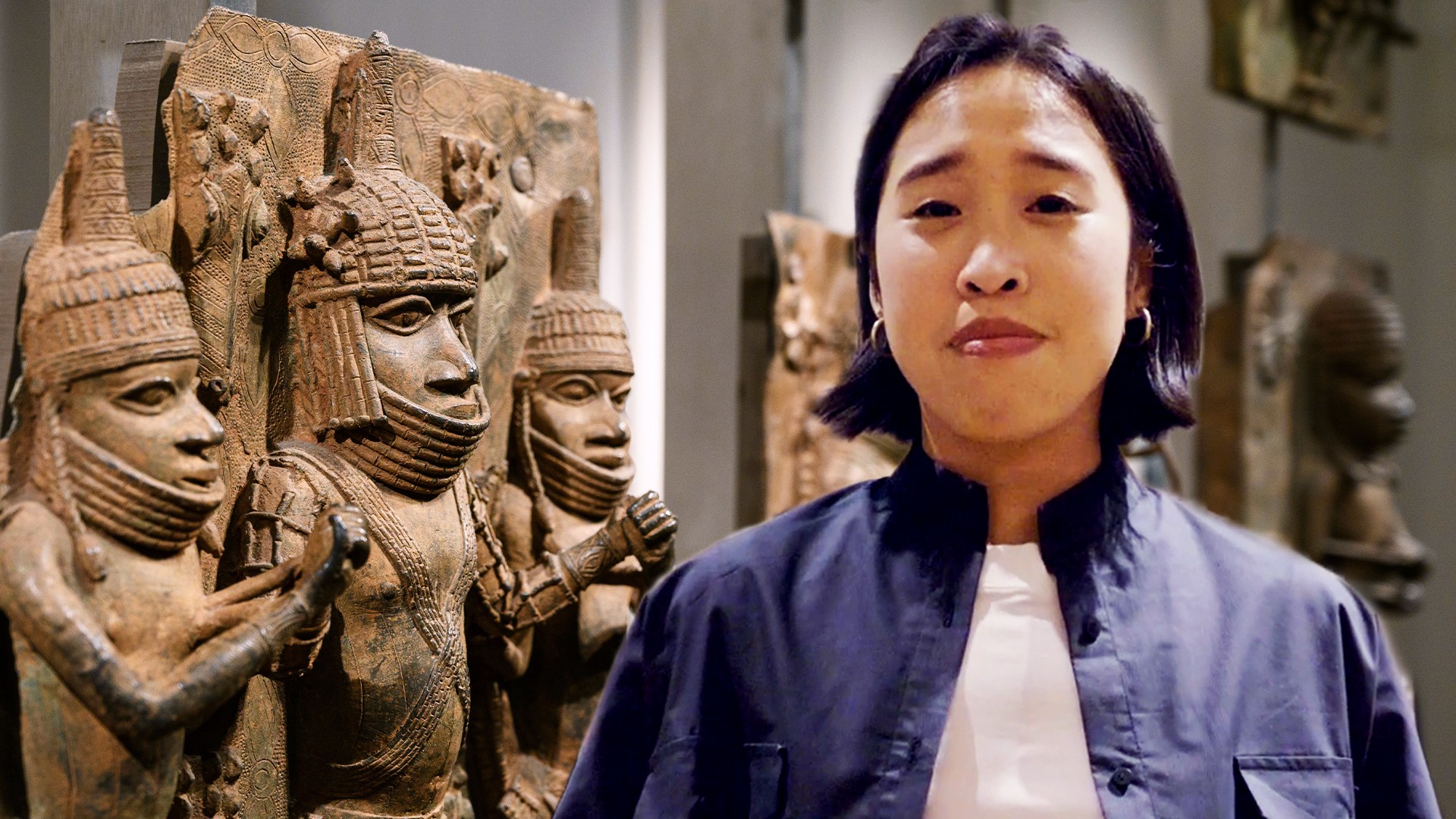A group of restitution advocates from across the world are calling on the British Museum to return artefacts that were stolen by the British Empire. The British Museum is home to around 8 million objects. The reality that many of these artefacts – around 99 percent of which are not placed on public display, but hoarded away in the institution’s private archives – were forcibly taken has led to decades-long demands for their restitution.
Advertisement
VICE World News has spoken to 10 advocates from 10 different countries about the origins and histories of 10 looted artefacts from their homelands housed in the British Museum, how these treasures are an essential part of their heritage, and why it’s imperative that they are returned immediately.It comes as VICE World News launches The Unfiltered History Tour – an alternative interactive tour of the British Museum that tells the true story of these 10 looted artefacts currently on display at the museum.People visiting the museum in person can directly scan the objects to find out more about them, unlocking an augmented reality that steps back in time to show the moment these items were taken. The experience, which utilises Instagram filter technology, also allows people not in the museum to take a virtual tour and find out more about the 10 artefacts. The unofficial tour features a comprehensive history of the looting and controversial acquisitions of Australia’s Gweagal Shield, India’s Amaravati Marbles, Iraq’s Ashurbanipal reliefs, Nigeria’s Benin Bronzes, Ghana’s Akan Drum, Egypt’s Rosetta Stone, Greece’s Parthenon Marbles, Rapa Nui’s Hoa Hakananai’a, Jamaica’s Birdman and Boinayel figures, and China’s Summer Palace.
Advertisement
The Unfiltered History Tour will also include a ten-part podcast series featuring interviews with all 10 experts, providing a broader education on the artefacts, as well as the history and ongoing impact of colonialism.  “The Rosetta Stone as it stands today, in the British Museum, it's a war spoil,” Heba Abd el Gawad, an Egyptian Egyptologist, told VICE World News. “That’s what it is in reality. It has never left Egypt legally….It’s a trophy of empire.”
“The Rosetta Stone as it stands today, in the British Museum, it's a war spoil,” Heba Abd el Gawad, an Egyptian Egyptologist, told VICE World News. “That’s what it is in reality. It has never left Egypt legally….It’s a trophy of empire.”

The Rosetta Stone is seen at the British Museum in London. Photo: Han Yan/Xinhua via Getty Images
El Gawad added: “What is also problematic is that we tell the story from the British Museum perspective, the European colonialism perspective. The stone became part of the national branding in Britain, people who travel to London just to see the Rosetta Stone, so it became part of the British national branding.”Demands for western museums to return their plundered colonial artefacts have intensified in recent years. This renewed push was partly sparked by the findings of a 2018 report that was commissioned by French President Emmanuel Macron to advise public museums on the issue of restitution. The report, written by art historian Bénédicte Savoy and Senegalese economist Felwine Sarr, concluded that “any objects taken by force or presumed to be acquired through inequitable conditions,” should be returned to their country of origin, with a broad definition of what constitutes force and inequity: all objects should be returned that were acquired through ‘military aggression’; or from the descendants of “military personnel or active administrators on the continent during the colonial period.”
Advertisement
The British Museum – as well as other national museums such as the V&A – has largely ignored similar recommendations, claiming that the 1963 British Museum Act blocks it from returning anything in their collection, even though the law permits it to return any object it considers “unfit to be retained in the collections of the Museum.”In a statement to VICE World News, a spokesperson for the British Museum said: “Each object in the collection has its own set of very nuanced circumstances around it, those you mention below are detailed on our website here. All objects in our collection have information provided in interpretation on site around how they entered the collection, as well as our current relationships with the relevant communities. There is also further detail on the current status of discussions via the web link above.”The expert voices that make up The Unfiltered History Tour certainly consider the items unfit to be retained. “The drum from the British Museum...is an Akan drum,” Ernest Domfeh, a Ghanaian drummer and dancer, told VICE World News. “It is from Ashanti, it is from Ghana. It is from my people. I think it is a drum that could be taken during the time of the King of Ashanti, Prempeh I...Back then the British were the overlords of the Ashantis because they were our colonial masters. They thought the Ashantis were powerful, so they needed to take hold of what is their source of power, so they could become powerless for them to rule them entirely.”
Advertisement
“Bronze making in my kingdom historically is about storytelling, is about archiving, and it's about documentation,” said Victor Ehikhamenor, an artist and writer from Benin in southwest Nigeria. “We have a lot of mythologies; histories of how kings rule; from the oral narrative of women that we sing the praise of the king, to storytellers to griots, that it falls into the hands of the bronze casters that are part of the community. For instance, if there's a story of how a king was able to fight a wild animal and defeat it, a bronze caster would take the liberty of creating the oba, the crown that he wore, the sword that he used, and the animal that he killed. And this will be represented in plaques. This is how we document history. And a chunk, a large part of this history, was stolen from us when the British looted the kingdom's artefacts. That page in our history book was ripped off very violently.” For the advocates, they see the looting not as distant, one-off events that occurred decades ago, but as an ongoing theft of objects and knowledge that continues to this day. “Chinese history and goods and cultural output becoming loot – it robs the Chinese people of the ability to learn about their own history, which I think is one of the most significant things about this discussion on repatriation and so-called contested goods,” Juliet Patrick, a 21-year-old of Chinese heritage, told VICE World News. It's the fact that, you know, the general public suffer because they lose these connections that they have with the history.”“Colonialism has never gone away,” el Gawad added. “Maybe there aren't British troops in Egypt, but there is still this influence, this knowledge; occupation. There is this colonialism of knowledge, we are not perceived as the successors of the ancient Egyptians. And we are not perceived as the ones who have the right of decision making of where our heritage should be, even how it should be interpreted, and how we can make use of it today in even understanding our present.”
